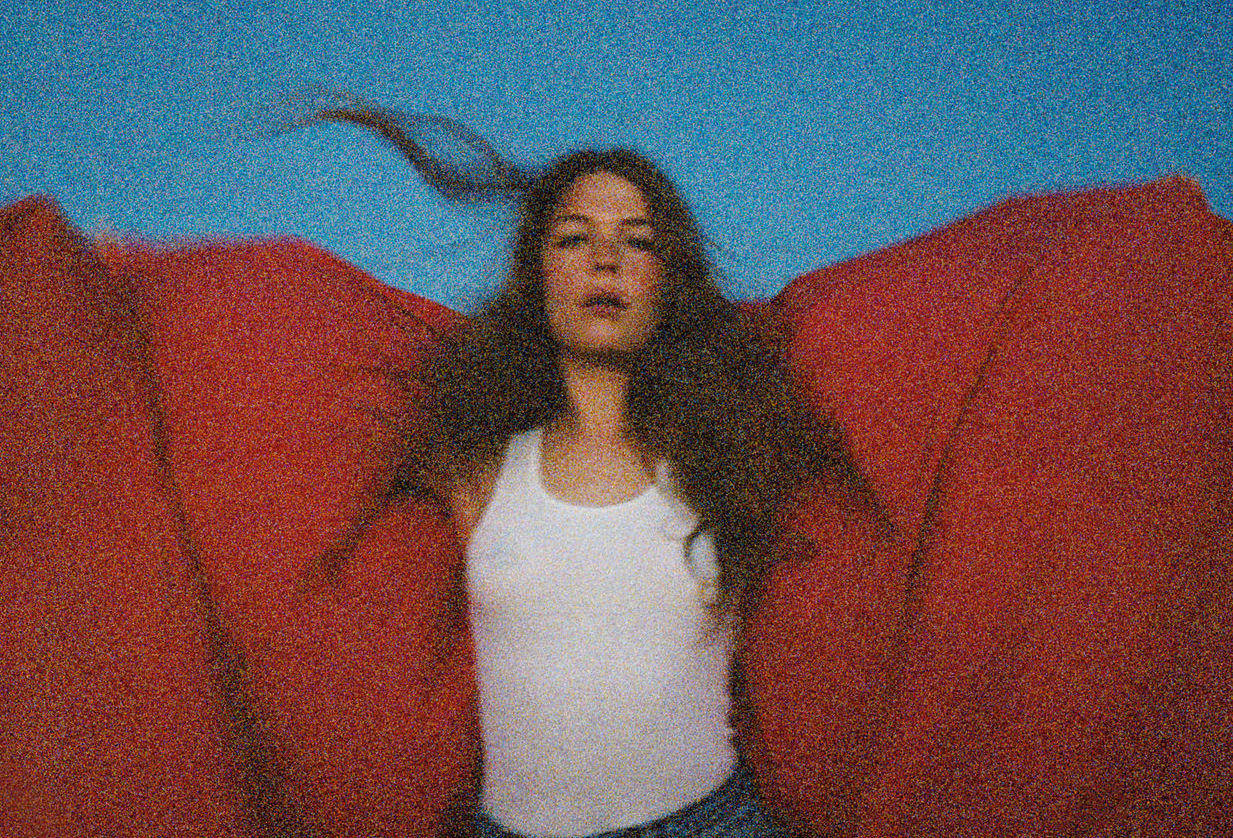Have you ever wondered what it would be like if you were recognized for your hard work overnight? What would you do if your videography skills were noticed by a large production company, or if your 400-page novel was picked up by a publishing house?
Maggie Rogers, a 24-year-old New York University graduate, is living the Cinderella story most people only wish they could have. In 2016, Rogers impressed Pharrell Williams in a masterclass with her song “Alaska.” Now, she’s touring the world and getting ready to release her major-label debut album.
Most college seniors struggle to find their first job after graduation; Rogers didn’t have that problem. “But, I graduated, and I guess very quickly had a job,” she said in an interview for NPR. When asked what that job was, she answered, “Uh, pop-star?”
Rogers used to introduce herself “as a banjo player from the eastern shore of Maryland.” She grew up with supportive parents who didn’t bat an eye when their daughter decided to study music at NYU, and their faith has paid off. Now, three years after her graduation, Rogers describes herself as a songwriter, producer and performer from Brooklyn.
When she went to New York for school, she was excited to be in such a cultural place. “I was really invested and excited to just be in New York and take it all in,” she said in an interview for Entertainment Weekly. “I spent my whole life in Maryland, but I wanted to experience more — fighting to get to urban areas where there was culture.”
Culture can have a huge impact on the creative process for anyone, but for a girl who grew up with folk music, playing the harp in the middle of nowhere, it can drastically change things. That’s probably why Rogers consciously decided to spend so much time in nature after her move to New York. Nature, and her time in it, plays a huge part in her music. The song that Rogers played for Williams in 2016 during her class was titled “Alaska,” and was inspired by the hiking she did in Alaska and the sounds that came from nature.
In addition to her musical talents, Rogers says that she’s an optimist and a feminist. Her website lists out the little things that make her who she is outside of her music, like her love for pink eyeshadow and her old jeans. “I feel a lot, maybe too much,” she wrote on the website. “But in a song, it always seems to be just enough.”
Music brings everyone together — or at least it does when people aren’t arguing about which song is actually the best. Sometimes, Rogers even thinks that music is magic. It’s a thing that, despite the fact that people can’t necessarily see it, makes them realize they feel the same way. Because of this, and because she loves it, Rogers wants to make music forever.
“It’s interesting,” Rogers told NPR. “I’ve never had any doubts about the music, but the reality of the music industry is something I had to learn.” Anyone who’s taken more than two seconds to think about it knows the music industry is no joke. It’s hard work, contracts and even more legalities than one cares to think about. In the interview, Rogers said that there are expectations that you just know how to do it. She not only had to learn how to navigate the industry, but to navigate it in a way that felt authentic and genuine to who she is.
Her rise to fame can loosely be credited to Williams’ appearance in her NYU masterclass. The class was filmed that day, uploaded to YouTube and then went viral. His reaction to the video is what inspired people to take notice of the small-town-raised city girl. In the video, Williams said, “I’ve never heard anyone like you before, and I’ve never heard anything that sounds like that, so, that’s a drug for me.”
Rogers is now living the life any aspiring musician wants to live. She’s signed to Capitol Records and is an alternative/indie artist. Her debut album, “Heard It in a Past Life,” released Jan. 18, and she has said that the album tells the story of the moment her life changed up until now.
“This record is about that moment and what’s happened since then,” said Rogers. “When that Pharrell video went viral, the reality is that I was incredibly overwhelmed and really scared and suddenly my very private life was very public without me having any control or say over it.” Not having any control over your life can be scary. And, although it’s possible to figure this transition out and get used to it, doing so takes time.
Rogers said that out of the 30 to 40 songs she originally wrote for the album, it was narrowed down to 12 tracks. The process she used to write her album is a bit different than what you might’ve heard about other artists. After her tour with Mumford & Sons, she went back home to Maryland, where she spent time reading, taking walks and just breathing.
Rogers describes herself as an extroverted introvert, saying that she “[gets her] energy from being alone, even though [she] loves being with people.” When she started thinking about and preparing to write her album, Rogers needed time to think. She said she can write a song in 10 minutes when she knows what she wants to say, but it takes her a lot of time to figure that out.
And even though she’s toured the world, met Pharrell Williams and had numerous talk show appearances, Rogers is incredibly humble about where she is professionally right now.
“That’s what’s been so great about being on tour. My life has [been] changed by people I’ll never meet,” she said in an interview with Williams and Scott Vener on “OTHERtone” on Beats 1. “Getting to sort of see some of the faces of some of the people who’ve made my life so different and really given me the ability to do what I’ve always wanted to do.”
Of course, even the humblest of people struggle with not being recognized for their work. Any creative person wants to talk about what they’ve spent their life doing. But, even though she would have loved to be recognized for all the work she put in over the last 10 years of her life, Rogers said that she probably talked about Pharrell Williams every day for over a year and a half.
She didn’t understand why she couldn’t just talk about her work and her music, and that was frustrating for her. Rogers learned a lesson that everyone can take note of; she learned where to focus her energy.

Rogers realized she couldn’t focus on not being recognized for her work right away (although, it would certainly make more sense to talk about her music rather than the man who showed up at her class). She now understands that it’s part of the process, and doesn’t want to let that focus stress her out. She’s a lot happier because of it.
In her most recent single, “Light On,” Rogers says she’s more vulnerable than she has been before. Due to the vulnerability in the song, she claims she was nervous about releasing it. Rogers used the song to try to explore and explain how she was feeling when her music was finally being recognized.
It’s the expectation that everything was suddenly perfect that seemed to be a breaking point for Rogers. “I sort of became this like cocktail party version of myself,” she told NPR. “Where I felt like I had to play the role of like, happy girl.” She describes it almost as a Cinderella story: “Girl gets plucked from obscurity, becomes star.”
A sudden change can be hard even for those who get to live out their wildest dreams and fantasies; she says that the chorus of “Light On” emphasizes what she really wants to say. It expresses the things that people may not have understood with her sudden rise to fame. It’s also a song that a listener can relate to an event in their life that makes them feel uncomfortable, but lucky.
Rogers starts the pre-chorus with, “Oh I couldn’t stop it / Tried to slow it all down / Crying in the bathroom / Had to figure it out/With everyone around me saying / ‘You must be so happy now.’”
The chorus says, “Oh, if you keep reaching out / Then I’ll keep coming back / And if you’re gone for good / Then I’m okay with that / If you leave the light on / Then I’ll leave the light on / And I am finding out / There’s just no other way / That I’m still dancing at the end of the day / If you leave the light on / Then I’ll leave the light on.”
For the listener, there’s no denying the song is a beacon of light and hope. The same can be said for Rogers. However, underneath the surface of the song there’s conflict. She’s mentioned many times that the abrupt change in her life was, in a way, too much for her to handle in that short period of time. Rogers describes the chorus of “Light On” as saying, “Okay, I’m going to do this. I’m going to be here for you in the way that you’ve been here for me.”
She knows just how lucky she is and how many people have taken part in her success. But if it were to be taken away, I think she would be okay. Or, at least, that’s what the song causes me to believe.














